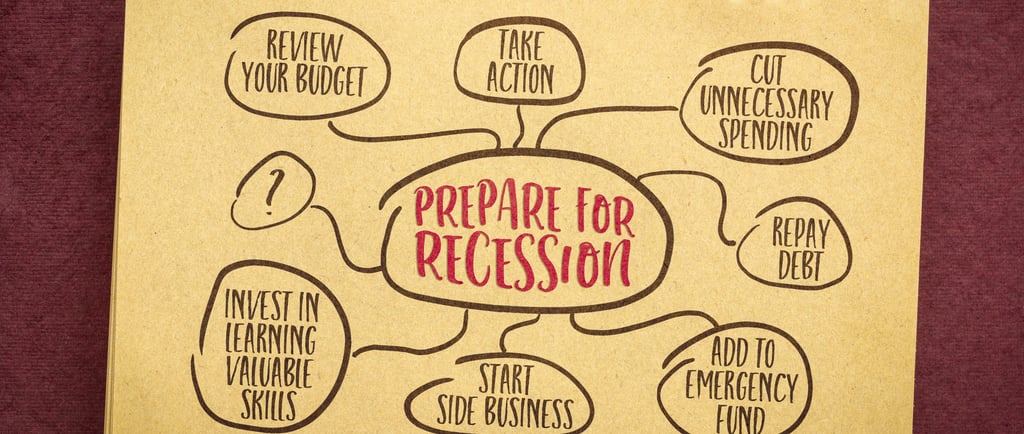Navigating Financial Uncertainty: Strategies for Managing and Growing Your Money During a Recession
With the U.S. economy showing signs of a slowdown and uncertainty on the rise, it's more important than ever to adopt smart financial strategies to protect your money and uncover new opportunities for growth during a recession.
Finistack
5/5/20253 min read


As the U.S. economy shows signs of a potential recession—with a 0.3% GDP contraction in Q1 2025 and consumer confidence at its lowest in five years , it's crucial to adopt proactive financial strategies.
1. Strengthen Your Financial Foundation
In uncertain economic times, establishing a robust financial foundation is paramount. Begin by building an emergency fund that covers three to six months of living expenses. This fund acts as a safety net against job loss or unexpected expenses, providing peace of mind during turbulent periods.
Reevaluating your budget is equally important. Scrutinize your spending to identify and eliminate non-essential expenses. Regularly updating your budget ensures it aligns with your current financial situation, allowing for adjustments as circumstances change.
Prioritizing debt repayment, especially high-interest debts like credit cards, can reduce financial strain and improve cash flow. By minimizing interest payments, you free up resources that can be redirected toward savings or essential expenditures.
2. Make Informed Investment Decisions
Investing during a recession requires a balanced and informed approach. Diversify your portfolio to include a mix of assets such as stocks, bonds, and cash. Diversification helps mitigate risk during market volatility, ensuring that a downturn in one sector doesn't disproportionately impact your overall investments.
Consider incorporating Series I Savings Bonds into your investment strategy. As of May 2025, these bonds offer a composite annual rate of 3.98%, combining a 1.1% fixed rate and a 2.86% variable rate that adjusts with inflation . I Bonds provide the dual benefits of inflation protection and principal security, making them a solid option for risk-averse investors seeking stable returns in uncertain markets.
It's crucial to avoid panic selling during market downturns. Historically, markets have rebounded over time, benefiting long-term investors who stay the course. Maintaining a long-term perspective can help you navigate short-term volatility without making impulsive decisions that could harm your financial future.
3. Explore Additional Income Streams
Diversifying your income sources can provide financial stability during a recession. Starting a side hustle in recession-resilient industries can supplement your primary income. For instance, delivery services have become increasingly popular, with over 50% of adults considering them essential. Engaging in food or grocery delivery can be a straightforward way to earn extra income.
The pet care industry is another recession-proof sector. Essential services like grooming, dog walking, and pet sitting continue to see demand even during economic downturns. The industry grew by 29% in 2001 and 17% in 2008-2009, highlighting its resilience.
Child care services also maintain steady demand, as parents require reliable care regardless of economic conditions. Starting a child care side hustle can be lucrative, especially when tailored to meet local community needs.
4. Learn from Historical Recessions
Understanding past recessions can provide valuable insights into navigating current economic challenges. The Great Recession of 2007–2009, triggered by crises in the housing and financial markets, led to significant economic downturns. However, the subsequent expansion began in July 2009 and became the longest economic recovery dating back to the mid-19th century.
The COVID-19 recession in 2020 was the shortest on record, lasting only two months. Despite the sharp economic downturn, markets recovered swiftly, highlighting the importance of staying the course with investments.
These historical examples underscore the resilience of the economy and the potential benefits of maintaining a long-term investment perspective during recessions.
5. Maintain Mental and Emotional Well-being
Financial stress during a recession can significantly impact mental health. It's essential to acknowledge and address these challenges proactively. Limiting exposure to distressing financial news can help reduce anxiety. Instead, focus on actionable steps you can take to improve your financial situation.
Engaging in regular financial check-ins can provide a sense of control and preparedness. Review your budget, track your expenses, and assess your financial goals periodically. These practices can empower you to make informed decisions and adapt to changing circumstances.
Seeking support from financial advisors, mental health professionals, or support groups can also be beneficial. Sharing experiences and strategies with others facing similar challenges can provide comfort and practical advice.
Conclusion
While recessions present challenges, they also offer opportunities for financial growth and resilience. By strengthening your financial foundation, making informed investment decisions, exploring additional income streams, learning from past downturns, and maintaining mental well-being, you can navigate economic uncertainty with confidence.
**Disclaimer: This blog may include AI-generated content derived from web crawling, and it features quotes from original cited inline or public sources. The information presented is for general informational purposes only and may not reflect the most current data or information available. While we strive for accuracy, we encourage readers to verify the information from original sources or reach out to a certified financial adviser for important financial decisions.
Follow Finistack on social media
Have abundant mindset, add value to this beautiful world, and enjoy your life the way you envision.
We move fast, so things aren’t always perfect. Help us level up — Share your feedback.
© 2026 Finistack LLC. All rights reserved.
Terms of Use
Privacy Policy
Terms and Conditions
Contact Us
About Us
